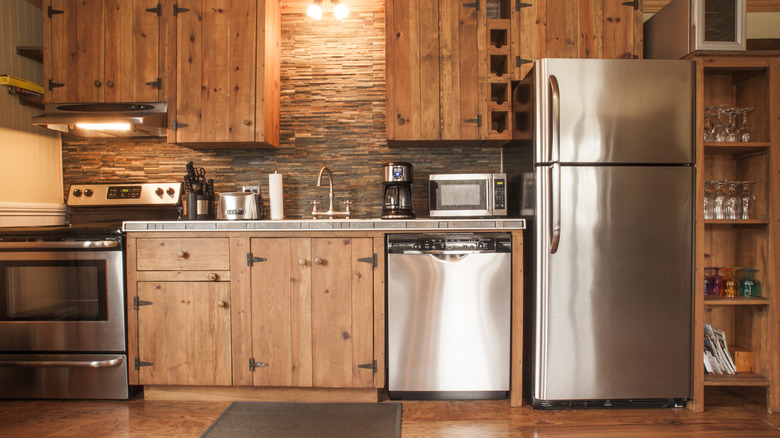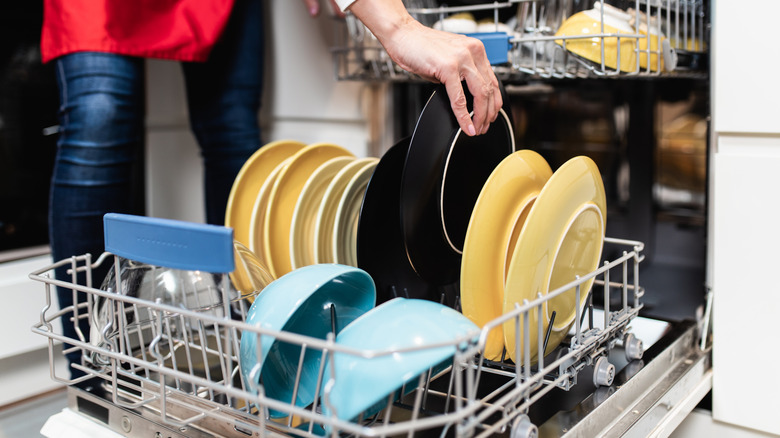Is Putting Your Dishwasher Next To Your Kitchen Fridge A Bad Idea? Our Appliance Expert Weighs In
Creating a kitchen layout can be something like a Rubik's cube. Figuring out where each appliance should go while confined to your kitchen's size often takes careful shifting and reshifting. Is it best to have your sink over the window or on the island? Should the stove be right next to the ovens, or can you split them? And where the heck should the fridge go? If you're tight on space, you might end up with a configuration that puts the fridge next to the dishwasher, which, at first glance, seems fine. But the fridge runs cold, and the dishwasher runs hot, so could it spell disaster in the end? We reached out to Garrett Bergstrom, a Virtual Appliance Expert for Frontdoor, to find out. While there might be advantages to putting these two appliances next to each other, Bergstrom exclusively tells House Digest that it's better to space them apart.
There are two reasons to keep them apart: The dishwasher can lower the fridge's life expectancy, and they might not look seamless visually. Since dishwashers use hot water, the increased heat around the appliance can warm the refrigerator next to it. Because of this, its life expectancy will suffer to keep food cool. As for aesthetics, the fridge and dishwasher usually don't have the same depth, so they can look a bit wonky paired next to each other. Here is a closer look into why keeping them apart is more beneficial.
Pairing them together can reduce the fridge's efficiency
Appliances are expensive, so we want to do everything we can to extend their life expectancy. On average, fridges last about 14 years, but a seemingly harmless placement next to a dishwasher could shave some time off of that. "Today's dishwashers use thermal holding to aid in drying dishes — which is an adjustment of time that works to either decrease or increase drying time. Added heat from the dishwasher may cause your refrigerator to run more often or even longer, due to a higher ambient temperature in the area," Bergstrom exclusively tells House Digest.
This will cause the motor to kick on to keep the programmed temperature inside the appliance, which will wear out its parts faster, causing its life expectancy to go down. If you decide to go with this configuration and begin to hear your fridge's motor kicking on — and noticeably loudly — the dishwasher might be affecting it, and you'll need to call a professional. The only advantage to putting them next to each other might be to limit plumbing and electrical work, but that, too, has its own set of drawbacks. "The main advantage ... would be having the water connection needed for both on the same wall, though note the fridge would require cold water and the dishwasher hot water," Bergstrom says. "The same could be said for proximity to electrical. However appliances should each be on their own dedicated circuit and power source."
Design drawbacks to placing your dishwasher next to your fridge
Having to replace your fridge earlier isn't the only drawback to placing the fridge and dishwasher next to each other. It's also a major kitchen layout mistake design-wise. "Note the fact that dishwashers and refrigerators are often not the same depth is something to consider when purchasing and placing your appliances," Bergstrom tells House Digest exclusively. Unless you get a counter-depth fridge or create a built-in, this can end up looking rather clunky. It would be more advantageous to move the dishwasher somewhere where it will be more helpful. "Instead, you might want to situate the dishwasher near the sink for ease of loading," he recommends.
Pairing them next to each other can also create a choppy workflow. Both appliances need to be opened for use, and if one person is in the fridge putting away leftovers and another is in the dishwasher loading dirty dishes, you can create a traffic jam in the work triangle. "Something to consider if you want your dishwasher right up next to your refrigerator is ease of use and protection for both. For example, if the door of the dishwasher (when open) is sticking out far enough that when the refrigerator or freezer door is open, they can collide and cause damage to both doors," Bergstrom warns. It's best to keep what's used to dirty and clean your dishes separate for these reasons.


